
F. Froger/Z9, for FranceSoir
Nvidia concluded with great fanfare the year which established it as the kingmaker of artificial intelligence (AI), with record revenues and profits, driven by strong demand for electronic components of which it is the undisputed master.
The AI chip giant achieved nearly $61 billion in revenue business and multiplied its net profit six-fold, to nearly 30 billion, over its entire annual financial year ended at the end of January, according to a results press release published on Wednesday.
“Nvidia has enabled the emergence of a new era of computing, that of generative AI, where software can learn, understand and generate all kinds of information: human language, biological structures or even 3D universes” , welcomed Jensen Huang, founder of Nvidia, during a conference with analysts.
Unknown to the general public until a year ago, the group from Santa Clara (California) manufactures graphics cards , processors called “GPUs”, initially designed for the needs of video games.
Their computing power, necessary for processing massive quantities of data, has made them essential to developers of generative AI models (OpenAI, Meta, Google, etc.).
This technology, which makes it possible to producing text, images and other data on a simple query in everyday language, has aroused extraordinary enthusiasm since the successful launch of ChatGPT by OpenAI at the end of 2022.
From November to January, Nvidia achieved $22 billion in revenue and $12.3 billion in net profit, results well above its forecasts and market expectations.
– “Party of AI” –
And demand is not weakening. The American company is counting on $24 billion in turnover for the current quarter.
Enough to impress Wall Street: Nvidia's stock jumped more than 9% during electronic trading after the closing of the New York Stock Exchange.
“Nvidia remains the only player capable of producing the GPUs that power the AI revolution,” recalled Wedbush analyst Dan Ives on Wednesday. “The AI revolution started with Nvidia and, in our opinion, the AI party is only just beginning.”
The year 2023 marked, according to him, “the beginning of the greatest technological transformation since the early days of the internet in 1995.”
Nvidia's graphics cards – like its flagship GPU, the H100, worth tens of thousands of dollars each – power servers in data centers specializing in AI.
This sector is became the group's main customer, with quarterly revenue that quadrupled in one year, to $18.4 billion.
Nvidia's components are essential for training language models with mountains of data, and also serve their practical application, or “inference”, when a user formulates a query and the model responds with the most probable logical sequence of words/pixels/sounds/code.
“Almost every time you interact with ChatGPT, every time you use Midjourney (image generator), every time you generate these incredible videos with Sora (latest from OpenAI) or Runway, Nvidia is doing inference “, underlined Jensen Huang.
“The share of inference in our activity has seen considerable growth, of the order of 40%.”
– Chinese shadow –
The demand for its components is such that the company must arbitrate between its customers, who are often competitors. “We do our best to allocate fairly and avoid allocating unnecessarily” when a data center is not yet ready, explained the US-Taiwanese leader.
“What makes Nvidia really unique is that we bring customers to our partners, the cloud providers. We bring them AI developers, biology companies, healthcare companies, financial services companies, vehicle companies autonomous, robotics, (…)”, assured Jensen Huang.
He also mentioned “sovereign AI”, that is to say the desire of many countries not to not depend on American AI models.
“They want to transform their own data, which belongs to them – their language, their history, their culture – to create their own digital intelligence,” he said. he detailed, betting on the development of “sovereign AI infrastructures” elsewhere than in the United States, but always with Nvidia chips.
The only downside for the group: the restrictions on exports to China imposed by the American government.
“We had to take a break on this market, to reconfigure our products so that they absolutely cannot be hacked,” admitted the engineer. “Our business suffered, but after the current quarter we hope to be able to return.”
Did you like the article? It mobilized our editorial staff which only lives on your donations.
Information has a cost, especially since competition from subsidized editorial staff requires additional rigor and professionalism.
With your support, France-Soir will continue to offer its articles free of charge because we believe that everyone should have access to free and independent information to form their own opinion.
You are the sine qua non condition for our existence, support us so that France-Soir remains the French media that allows the most legitimate expression.

